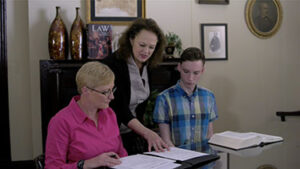 When dealing with personal injury cases, the law assigns you legal duty to take reasonable care to uphold the safety of other people and property. If your careless actions result in injury or damage to property, it is considered negligence. The negligent person is held liable for the injury and can be asked to compensate the injured party for the injury.
When dealing with personal injury cases, the law assigns you legal duty to take reasonable care to uphold the safety of other people and property. If your careless actions result in injury or damage to property, it is considered negligence. The negligent person is held liable for the injury and can be asked to compensate the injured party for the injury.
Negligence occurs when you fail to take reasonable care to prevent an accident. This could be out of carelessness or oversight that a prudent person would have avoided, such as maintenance of your tires to avert a tire blowout accident. In this case, the liable person breaches a duty of care, factually causing a loss or harm to another person. Gross negligence is a higher level of negligence, such as wanton endangerment (driving while intoxicated or driving a vehicle deliberately into a crowd. Sometimes, gross negligence can result in criminal charges.
What’s In This Guide:
- Factors in Negligence Situations
- Difference Between Negligence and Gross Negligence
- Liabilities for Gross Negligence
- Legal Approach for Gross Negligence Personal Injury Case
- Gross Negligence and Waivers
Factors in Negligence Situations
Whether you are suing for negligence or gross negligence, here are the four factors to consider:
Duty of Care
This refers to how a reasonable or socially responsible person is expected to behave in a specific situation. You must prove that you acted reasonably and the injury resulted from the defendant’s failure to act reasonably.
Breach of Duty of Care
You must prove that the defendant’s gross or intentional conduct was outrageous and beyond regular standard of care.
Causation
The law requires the plaintiff to prove that the defendant’s negligent actions are responsible for the victim’s suffering. This could be proving that a car crash in which you were injured happened due to drunken driving and you were injured as a result.
Damages
Damages include financial, emotional, and physical losses incurred due to an accident caused by a breach of duty. In a gross negligence personal injury case, you can collect punitive damages.
while negligence occurs unintentionally, gross negligence involves pre-meditated deliberate failure to act reasonably with the intent to cause harm to the victim. The damage may be unintentional, but the defendant knowingly acts in a way that potentially puts people at risk of injuries, such as speeding or drunk driving.
Difference Between Negligence and Gross Negligence
While negligence occurs unintentionally, gross negligence involves willful misconduct by the defendant. For instance, anyone may get involved in a motor vehicle accident due to careless driving that may be considered negligence.
However, a drunk driver chooses to engage in the misconduct. If they cause an accident and cause an injury, they are liable for gross negligence even if they did not intend to cause the accident or injury.
Negligence usually occurs momentarily. On the other hand, gross negligence may stem from a pattern of actions or conduct that shows a blatant disregard for people’s health and safety.
In gross negligence, the defendant intentionally fails to act reasonably to prevent damage or harm to other people or property. They may not have intended to harm the victim, but their actions lead to an accident that causes physical, mental, or financial loss for the plaintiff.
Gross negligence occurs when the at-fault party acts or fails to prevent unreasonable risk of injury to the plaintiff. It may result in severe penalties than normal negligence. For instance, the penalty for drunk driving may be more severe than that of a sober driver who causes an injury due to faulty brakes.
Liabilities for Gross Negligence
While pursuing compensation for personal injury due to negligence, you may be reimbursed for unexpected medical bills, property damage, loss of earning capacity, mental anguish, and the pain associated with the injury. Gross negligence awards punitive damages intended to punish the at-fault party for their deliberate disregard for your safety and health.
You should request punitive damages if your injury resulted from deliberate and/or reckless behavior by the at-fault party. A jury awards punitive damages to deter the defendant or other people from repeating the error in the future. Punitive damages are not meant to benefit the victim but to punish the defendant for his outrageous conduct.
Punitive damages are capped to a certain percentage of the compensatory damages. In Bowling Green, the law does not limit the amount you can receive from punitive damages payments.
There has to be evidence of subjective intent. For the jury to demand punitive damages from the defendant, you should prove that the defendant acted in bad faith and reckless disregard of the rights, health, and safety of the victim.
Legal Approach for Gross Negligence Personal Injury Case
The at-fault’s insurance services provider may not pay you punitive damages as insurance companies cover actual damages caused by the defendant. This does not mean you can’t get extra recoveries from punitive damages.
When pursuing compensation for outrageous gross negligence, consider filing a court case for personal injury and punitive damages compensation. A good personal injury law firm like Flora Templeton Stuart helps in filing your personal injury case and pursuing punitive damages compensation for you.
Punitive damages are not tied to any of the losses you suffer from an accident. These losses are compensated for under the regular damages like medical expenses, lost mobility for your limbs, lost work hours and earning opportunities, and non-economic damages like the pain and suffering caused by your injury.
On the other hand, punitive damages aim to punish the defendant. However, the victim receives any compensation paid by the defendant as punitive damages.
Punitive damages compensations are not common. Contract a trustworthy and knowledgeable personal injury attorney to argue your case as punitive damages compensation
Your personal injury attorney argues out the amount you deserve as punitive damages on top of the regular compensation the jury awards you. Therefore, you need an experienced, reliable attorney for your personal injury case to ensure the highest financial recoveries from your court proceedings.
Gross Negligence and Waivers
You may have waived any rights to sue the defendant for negligence. For example, if you are taking skating classes, you may have signed a contract stating that the school will not be held liable for any injuries occurring during training.
While this is a waiver for negligence, it does not include gross negligence. Waivers against gross negligence are unacceptable, meaning you can sue the defendant for gross negligence even if you waived that right in your contract.
Talk to a Personal Injury Attorney
When pursuing your gross negligence personal injury case in Bowling Green, talk to Flora Templeton Stuart Accident Injury Lawyers. At Flora Templeton Stuart Accident Injury Law Firm, we are responsive, helpful, and go beyond the call of duty to help you with your personal injury case.
We put your welfare ahead of money, and you only pay us after winning compensation. With over two decades of experience in personal injury cases, we know what you need to do to get maximum payment for your damages.
We specialize in work-related injuries, semi-truck accidents, car accidents, slip and fall accidents, wrongful death, among other areas of the law.
We understand your circumstances may hinder you from visiting our highly accessible offices. We, therefore, meet you at your convenient venues such as your hospital, home, or any location of your choice.
You can reach us any day of the week, day or night, about your personal injury case with queries. Contact us today for a free evaluation of your gross negligence personal injury case.
